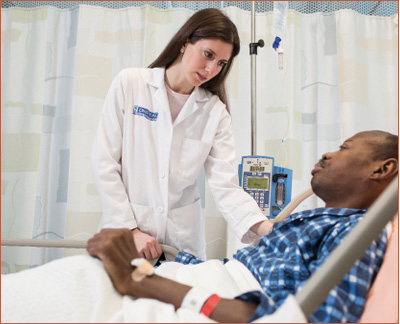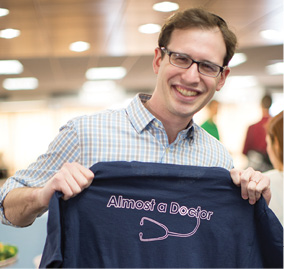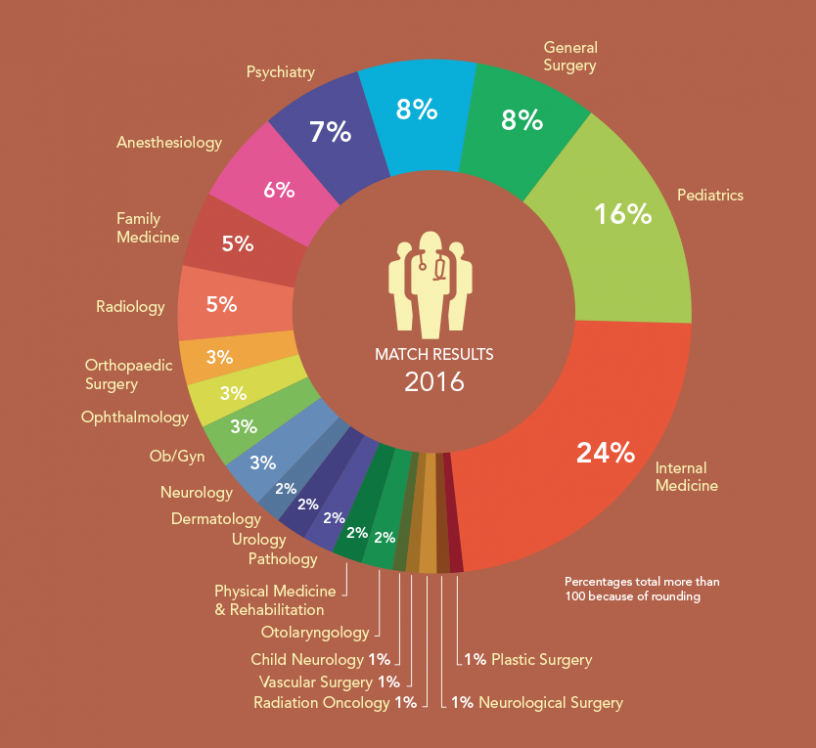
Error: No layouts found
Competency Criteria
 Television’s Dr. House—a brilliant diagnostician who is stunningly deficient in people skills—probably wouldn’t be admitted to medical school today.
Television’s Dr. House—a brilliant diagnostician who is stunningly deficient in people skills—probably wouldn’t be admitted to medical school today.
Bedside manner and an array of other abilities are now being factored into medical school admissions decisions, thanks to a new Association of American Medical Colleges (AAMC) initiative. The AAMC has endorsed an admissions policy that considers an applicant’s leadership ability, communication skills, commitment to service, maturity and compassion as well as grades. The Class of 2019 is the first group to be admitted to Einstein based on these “competency-based admissions” (CBA) criteria.
“To be successful physicians, medical students need to do more than just meet requirements on a checklist,” says Noreen Kerrigan, M.P.A., associate dean of admissions. She and other members of Einstein’s admissions committee wrote a report on their experiences developing and implementing the new standards, which was published in Medical Education Online early this year.
Einstein will track CBA students as they move through their medical education, residencies and career choices.
Brainstorming for Curriculum Reform
Think outside the box. Dream big. Imagine new ways for Einstein to give graduates every advantage in the ever-changing world of medicine. Thoughts such as these were on the minds of some 130 faculty, students, community members and guest speakers at Einstein’s first Thought Leaders Conference on curriculum reform, held earlier this year in the Education Center and Robbins Auditorium.
Responding to a call from the AAMC and other organizations, medical schools across the country are redesigning their curricula. “Graduates need to be ready to face a flood of new scientific information, constant advances in technology, continual restructurings of healthcare delivery and financing and changes in society,” said Martha S. Grayson, M.D. ’79, Einstein’s senior associate dean for medical education.
 The Thought Leaders Conference kicked off the Einstein initiative. “Medical education needs to be aligned with what’s happening in the healthcare environment, and its overarching goal should be to improve health outcomes,” said keynote speaker Maryellen E. Gusic, M.D., president of the Academic Pediatric Association and a past chief medical education officer at the AAMC. In her view, an effective education program:
The Thought Leaders Conference kicked off the Einstein initiative. “Medical education needs to be aligned with what’s happening in the healthcare environment, and its overarching goal should be to improve health outcomes,” said keynote speaker Maryellen E. Gusic, M.D., president of the Academic Pediatric Association and a past chief medical education officer at the AAMC. In her view, an effective education program:
Dr. Grayson followed with a presentation on engagement as the heart of the process. Next came “vision presentations” by faculty members and students. “We had 42 presentations and published 93 proposals,” notes Dr. Grayson. Topics ranged from curricular themes and the structure of a medical school curriculum to teaching methods and effective assessments. Working groups from the Curricular Design Executive Committee are now reviewing the proposals generated at the conference. Curricular updates will occur over four years, beginning in the fall of 2017 with the class of 2021.
Match Day 2016
 “On Match Day, students feel an enormous anticipation,” says Stephen G. Baum, M.D., senior associate dean for students at Einstein. “The envelopes they receive hold their futures. The good news is our students do very well in the match, and this year is no exception. It’s a day to toast their achievements and future careers as practicing physicians.”
“On Match Day, students feel an enormous anticipation,” says Stephen G. Baum, M.D., senior associate dean for students at Einstein. “The envelopes they receive hold their futures. The good news is our students do very well in the match, and this year is no exception. It’s a day to toast their achievements and future careers as practicing physicians.”
Eighty-eight of the 197 Einstein M.D. and M.D.-Ph.D. students who matched will enter primary care specialties: 48 matched to internal medicine (#1), 31 to pediatrics (#2) and 9 to family medicine (#7). Rounding out the top 10 matched specialties this year were: emergency medicine (16 students), surgery (14), psychiatry (13), anesthesiology (11), radiology—diagnostic (9), neurology (6) and orthopedics (6). This year saw an uptick in matches to surgery and psychiatry. Close to a quarter of Einstein’s graduating students will stay in the Einstein community, joining Montefiore or an affiliated hospital.
